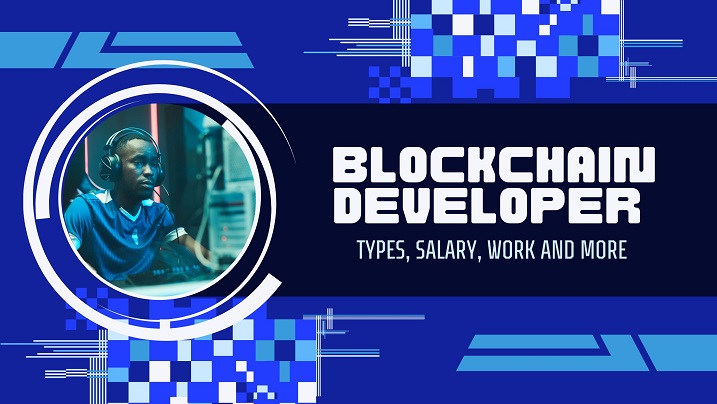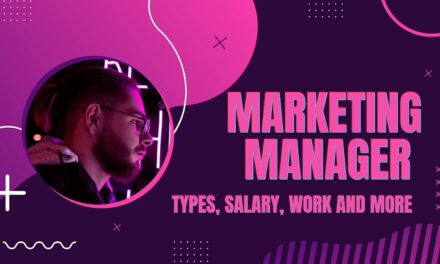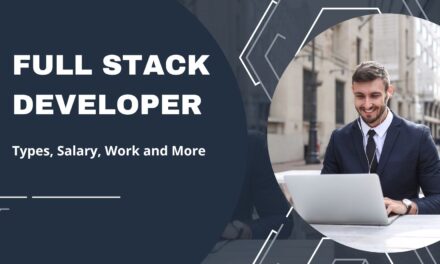Blockchain Developer – Types, Salary, Work and More in 2024
A blockchain developer is a professional who is responsible for designing, developing, and implementing blockchain-based solutions for various industries.
Blockchain is a distributed ledger technology that provides a secure and transparent way of recording transactions and data.
Blockchain developers play a crucial role in the development of blockchain-based applications, such as cryptocurrencies, smart contracts, and decentralized applications.
What is Blockchain Developer
As a blockchain developer, one needs to have strong programming skills and a good understanding of cryptography and decentralized systems.
Some of the key skills required for a successful blockchain developer include proficiency in programming languages like C++, JavaScript, Solidity, and Python, knowledge of smart contracts, and a good understanding of distributed ledger technology.
Blockchain developers can work in a variety of industries, including finance, healthcare, supply chain, and more.
They typically work with a team of other developers and engineers to build and test decentralized applications that can be used to streamline business processes, reduce costs, and increase transparency and security.
The demand for blockchain developers has increased significantly in recent years, with many companies looking to explore the potential of blockchain technology.
As blockchain continues to gain popularity, the demand for skilled blockchain developers is likely to grow, making it an exciting and rewarding career path.
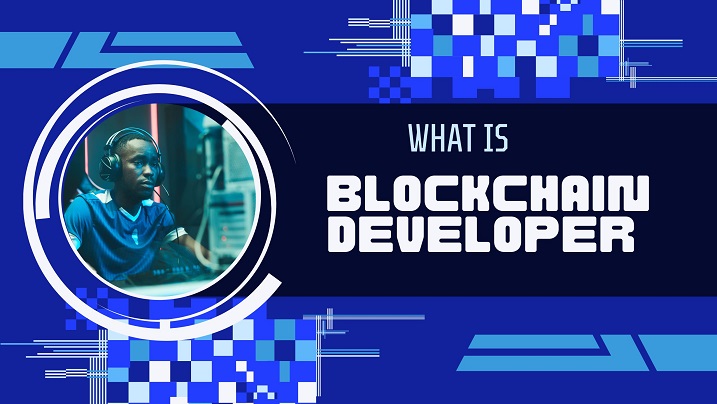
Some of the key responsibilities of a blockchain developer include:
Designing and developing blockchain-based applications: Blockchain developers use programming languages such as Solidity, Java, and Python to develop decentralized applications and smart contracts on blockchain platforms such as Ethereum, Hyperledger Fabric, and Corda.
Writing smart contracts: Smart contracts are self-executing contracts that are programmed to automatically execute when certain conditions are met. Blockchain developers write smart contracts using programming languages such as Solidity and deploy them on blockchain platforms.
Testing and debugging code: Blockchain developers test and debug code to ensure that applications and smart contracts function properly and meet the requirements of the client.
Integrating blockchain technology with existing systems: Blockchain developers work with other developers and stakeholders to integrate blockchain technology with existing systems and applications.
Maintaining and upgrading blockchain-based applications: Blockchain developers are responsible for maintaining and upgrading blockchain-based applications to ensure that they remain secure and functional.
To become a blockchain developer, you typically need to have a strong background in computer science or a related field, as well as experience in programming and software development. Some specific skills and knowledge required for a career in blockchain development include:
Understanding of blockchain technology: A blockchain developer should have a deep understanding of blockchain technology and its various components, such as blocks, transactions, and consensus algorithms.
Proficiency in programming languages: Blockchain developers should be proficient in programming languages such as Solidity, Java, and Python, as well as have experience in developing smart contracts and decentralized applications.
Knowledge of blockchain platforms: A blockchain developer should know various blockchain platforms, such as Ethereum, Hyperledger Fabric, and Corda.
Familiarity with cryptography: Blockchain technology relies on cryptography for security. A blockchain developer should have a good understanding of cryptographic algorithms and techniques.
Strong problem-solving skills: Blockchain developers should have strong problem-solving skills and be able to think critically to develop effective solutions to complex problems.
Overall, blockchain development is a highly specialized field that requires a combination of technical skills and knowledge of blockchain technology.
Types of Blockchain Developers
There are several types of blockchain developers, each with a specific set of skills and responsibilities. Here are some of the common types of blockchain developers:
Core Blockchain Developer: These developers work on the core development of the blockchain platform, such as Bitcoin or Ethereum. They are responsible for developing and maintaining the protocol, consensus algorithm, and network architecture.
Smart Contract Developer: Smart contract developers create self-executing contracts that are programmed to automatically execute when certain conditions are met. They typically use programming languages such as Solidity to develop and deploy smart contracts on blockchain platforms.
DApp Developer: DApp (Decentralized Application) developers create decentralized applications that run on blockchain platforms. They use programming languages such as Solidity, Java, and Python to build the front-end and back-end of the application.
Blockchain Security Engineer: Blockchain security engineers are responsible for ensuring the security of blockchain-based applications and networks. They use their knowledge of cryptography and cybersecurity to identify and mitigate security risks.
Blockchain Architect: Blockchain architects design the overall architecture of blockchain-based systems. They are responsible for determining the appropriate blockchain platform, consensus algorithm, and network design for a specific use case.
Blockchain Consultant: Blockchain consultants provide expert advice on the use of blockchain technology for various industries. They help organizations identify opportunities to leverage blockchain technology and develop strategies to implement blockchain-based solutions.
Each type of blockchain developer requires a specific set of skills and knowledge. However, all blockchain developers must have a deep understanding of blockchain technology, programming languages, and cybersecurity.
How to become a Blockchain Developer
Becoming a blockchain developer typically requires a combination of education, training, and experience. Here are the general steps you can take to become a blockchain developer:
Gain a strong foundation in computer science: This can be achieved by pursuing a degree in computer science or a related field. It’s important to learn programming languages such as Java, C++, Python, and Solidity, which are commonly used in blockchain development.
Learn blockchain technology: Learn the fundamentals of blockchain technology, including distributed ledger systems, consensus algorithms, and smart contracts. There are various online courses, tutorials, and books available that can help you learn blockchain technology.
Gain experience with blockchain platforms: Get hands-on experience by building projects on blockchain platforms like Ethereum, Hyperledger, and Corda. Participate in blockchain hackathons or contribute to open-source blockchain projects.
Learn blockchain development tools: Familiarize yourself with blockchain development tools, such as Truffle, Remix, and Ganache, that are commonly used by blockchain developers.
Stay up to date with the latest developments: The field of blockchain development is rapidly evolving, and it’s important to stay up to date with the latest trends and technologies. Attend conferences, join blockchain developer communities, and read industry publications to stay informed.
Obtain blockchain developer certification: There are various blockchain developer certifications available, such as the Certified Blockchain Developer (CBD) certification offered by Blockchain Council or the Certified Ethereum Developer (CED) certification offered by ConsenSys.
Becoming a blockchain developer requires a commitment to continuous learning and staying up to date with the latest developments in the field. It’s a challenging but rewarding career that offers many opportunities for growth and innovation.
What is the salary of a Blockchain Developer in India?
According to various job portals in India, the average salary for a blockchain developer in India ranges from ₹6,00,000 to ₹20,00,000 per year, depending on the experience and skill level of the developer.
However, the actual salary can vary based on location, industry, and employer. In metropolitan cities such as Delhi, Mumbai, and Bangalore, the salaries are generally higher due to the higher cost of living and the demand for skilled blockchain developers in those areas.
It’s worth noting that the field of blockchain development is rapidly evolving, and salaries and job opportunities may continue to evolve.
What is the salary of a Blockchain Developer in foreign countries?
The salary of a blockchain developer in foreign countries can vary widely depending on the location, the employer, and the developer’s level of experience and skills.
According to various job portals and surveys, the average annual salary for a blockchain developer in the United States is around $120,000, while in the United Kingdom, it is around £70,000 ($97,000).
In Canada, the average salary for a blockchain developer is around CAD 85,000-90,000 ($67,000-$71,000) per year, and in Australia, it is around AUD 120,000-130,000 ($90,000-$97,000) per year.
However, it’s important to note that these figures are only averages, and the actual salary can vary based on a range of factors, including the specific role, company, and location.
Additionally, the field of blockchain development is rapidly evolving, and salaries and job opportunities may continue to evolve.
Blockchain Developer Specialist
A blockchain developer specialist is a professional who has a deep understanding of blockchain technology, including its design principles, algorithms, and architecture.
They have specialized knowledge of various blockchain platforms, including Ethereum, Hyperledger Fabric, and Corda, as well as experience in developing decentralized applications (DApps) and smart contracts.
In addition to their technical expertise, blockchain developer specialists are skilled in programming languages such as Solidity, Go, and Python, as well as development frameworks such as Truffle and Remix. They are also familiar with distributed systems and cryptography.
Some of the key responsibilities of a blockchain developer specialist may include:
- Designing and developing blockchain-based solutions for specific use cases and business needs
- Writing, testing, and deploying smart contracts on blockchain platforms
- Integrating blockchain technology with other systems and applications
- Implementing and customizing consensus algorithms for different blockchain networks
- Conducting code reviews and ensuring the security and reliability of blockchain applications
- Staying up-to-date with the latest developments in blockchain technology and contributing to the open-source blockchain community.
Given the specialized skills and knowledge required, blockchain developer specialists are in high demand in industries such as finance, healthcare, and supply chain management, among others. They may work as part of a development team in a company or organization, or as independent consultants or freelancers.
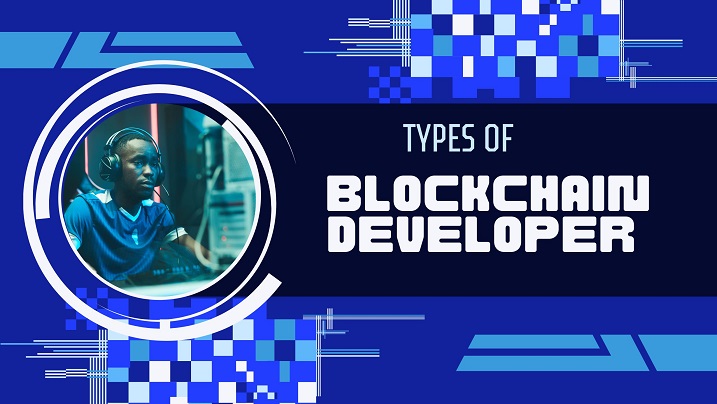
FAQ
What is needed to be a blockchain developer?
To become a blockchain developer, several skills and knowledge areas are required. These include:
Programming skills: A blockchain developer should have a strong background in programming languages, including Solidity, Go, C++, Python, and JavaScript.
Understanding of blockchain technology: A blockchain developer must have a deep understanding of blockchain technology, including its design principles, consensus algorithms, and cryptographic techniques.
Familiarity with blockchain platforms: A blockchain developer should be familiar with popular blockchain platforms, such as Ethereum, Hyperledger Fabric, and Corda, and have experience developing decentralized applications (DApps) and smart contracts.
Knowledge of distributed systems: A blockchain developer should understand how distributed systems work, including how nodes communicate with each other and how consensus is reached.
Attention to detail: Blockchain technology requires a high level of attention to detail, as even small errors can have significant consequences.
Problem-solving skills: A blockchain developer should have strong problem-solving skills, as they will need to identify and resolve technical issues quickly and efficiently.
Continuous learning: Given the fast-evolving nature of blockchain technology, a blockchain developer must be committed to continuous learning and staying up-to-date with the latest developments in the field.
Collaboration: A blockchain developer should be able to work well as part of a team, collaborating with other developers, designers, and business stakeholders to develop blockchain-based solutions that meet specific business needs.
Does blockchain require coding?
Yes, blockchain development requires coding. Blockchain is a decentralized and distributed digital ledger that utilizes cryptography to ensure the integrity and security of transactions.
Developing applications and smart contracts on blockchain platforms requires coding knowledge in programming languages such as Solidity, Go, C++, Python, and JavaScript.
Understanding the principles and mechanics of blockchain technology is also crucial to developing and deploying blockchain-based solutions.
How difficult is blockchain coding?
Blockchain coding can be challenging and requires a solid understanding of programming concepts and cryptography. However, the difficulty level can vary depending on the level of complexity of the application being developed and the blockchain platform being used.
Here are some factors that can make blockchain coding challenging:
Complexity: Developing blockchain applications requires a strong understanding of data structures, algorithms, and cryptography, which can be complex.
New technology: Blockchain technology is relatively new, and the development tools and frameworks are constantly evolving, which can be challenging to keep up with.
Debugging: Debugging blockchain code can be challenging since blockchain applications run on a decentralized network, and errors may not be immediately apparent.
Security: Blockchain applications involve the exchange of valuable assets and require a high level of security. Therefore, security considerations need to be factored in during development.
Testing: Testing blockchain applications can be challenging since they must be tested on a distributed network rather than on a local machine.
However, with the right training, resources, and practice, blockchain coding can be learned and mastered like any other coding skill.
Which language is best for blockchain?
There are several programming languages used for blockchain development. The choice of programming language depends on the blockchain platform and the specific requirements of the project. Some popular programming languages for blockchain development are:
Solidity: Solidity is a high-level programming language designed specifically for writing smart contracts on the Ethereum blockchain.
Go: Go is a general-purpose programming language that is widely used for blockchain development. It is the primary programming language for the Hyperledger Fabric blockchain platform.
C++: C++ is a popular programming language for blockchain development, especially for developing blockchain core protocols.
Python: Python is a versatile programming language and is widely used for developing blockchain applications.
JavaScript: JavaScript is a widely used programming language and is often used for developing decentralized applications (dApps) on blockchain platforms such as Ethereum.
Other programming languages such as Rust, Java, and Kotlin are also gaining popularity for blockchain development. Ultimately, the choice of the programming language will depend on the specific requirements of the project and the blockchain platform being used.
Can Python be used for blockchain?
Yes, Python is a versatile programming language and can be used for blockchain development. Python has a wide range of libraries and frameworks that can be used for blockchain development, such as:
Pyethereum: Pyethereum is a Python-based Ethereum client that allows developers to create smart contracts and decentralized applications (dApps) on the Ethereum blockchain.
Web3.py: Web3.py is a Python library that allows developers to interact with Ethereum nodes and smart contracts.
BigchainDB: BigchainDB is a scalable blockchain database that uses a Python-based API.
Hyperledger Sawtooth: Hyperledger Sawtooth is a modular blockchain platform that supports multiple languages, including Python.
Python can also be used for blockchain-related tasks such as data analysis and visualization, as well as building blockchain-related tools such as wallets and explorers.
Overall, Python is a popular language for blockchain development and has a growing number of libraries and tools available for use in the blockchain space.
Is blockchain development a hard job?
Becoming a blockchain developer can be a challenging and demanding job, as it requires a strong understanding of computer science, cryptography, and distributed systems.
Additionally, blockchain developers need to be familiar with the latest blockchain technologies and platforms, as well as programming languages such as Solidity, C++, Java, or Python.
However, the difficulty of the job can vary depending on the specific role and project. For example, some blockchain development jobs may involve more backend development work, while others may focus on creating smart contracts and decentralized applications (dApps).
Additionally, the complexity of the project and the level of experience of the developer can also impact the difficulty of the job.
Overall, while blockchain development can be a challenging job, it can also be a rewarding and lucrative career for those with the right skills and expertise.
Can a nontechnical person learn blockchain?
Yes, a non-technical person can learn blockchain technology. While a background in computer science or programming can be helpful, it is not necessary to have the technical expertise to learn about blockchain.
There are many resources available online that can help non-technical individuals learn about blockchain technology, including articles, videos, tutorials, and online courses.
These resources can cover topics such as the basics of blockchain, the different types of blockchains, smart contracts, and decentralized applications (dApps).
Additionally, some blockchain platforms and tools are designed to be more accessible to non-technical users. For example, some blockchain platforms allow users to create and deploy smart contracts using a visual interface, without requiring knowledge of programming languages.
Overall, while having technical expertise can help understand the intricacies of blockchain development, a non-technical person can still gain a solid understanding of blockchain technology and its potential applications with the right resources and dedication to learning.
Which is better data science or blockchain?
Both data science and blockchain are important technologies that offer great potential for career growth and development. Which one is better for an individual depends on their skills, interests, and career goals.
Data science involves analyzing and interpreting complex data to identify patterns and insights that can be used to inform business decisions.
It requires skills in programming, statistics, and data visualization, among others. Data science is a rapidly growing field with a high demand for skilled professionals in industries such as healthcare, finance, and technology.
On the other hand, blockchain is a decentralized ledger technology that enables secure and transparent transactions without the need for intermediaries.
Blockchain developers require skills in programming languages such as Solidity and knowledge of blockchain platforms such as Ethereum. Blockchain is also a rapidly growing field, with applications in finance, supply chain management, and other industries.
Both fields offer exciting career opportunities with high demand for skilled professionals. Ultimately, the choice between data science and blockchain depends on an individual’s skills, interests, and career goals.
Can a fresher be a blockchain developer?
Yes, a fresher can become a blockchain developer. However, becoming a blockchain developer typically requires a strong understanding of programming concepts, knowledge of blockchain technology and its various platforms, as well as experience working with blockchain development tools and languages such as Solidity.
To become a blockchain developer as a fresher, it is important to gain a solid foundation in programming concepts and languages such as Python, JavaScript, and C++. Additionally, it is recommended to learn about blockchain technology and its various platforms through online courses, tutorials, and certifications.
Participating in blockchain hackathons, contributing to open-source blockchain projects, and building projects using blockchain technology can also help to gain practical experience and develop a strong portfolio that can demonstrate skills and knowledge to potential employers.
In summary, becoming a blockchain developer as a fresher is possible with a strong foundation in programming concepts and knowledge of blockchain technology, along with practical experience through building projects and contributing to open-source blockchain projects.
Blockchain developer course
There are a variety of courses available for individuals interested in becoming a blockchain developer. These courses can range from introductory courses to more advanced programs that cover topics such as blockchain architecture, smart contracts, and decentralized applications.
Here are some examples of courses that can help individuals become blockchain developers:
Blockchain Basics by IBM: This is a free online course that covers the basics of blockchain technology, including distributed systems, consensus algorithms, and smart contracts.
Certified Blockchain Developer (CBD) by Blockchain Council: This is a certification program that covers topics such as blockchain architecture, consensus algorithms, and smart contracts. The program also includes hands-on projects to help individuals gain practical experience.
Blockchain Developer Bootcamp by ConsenSys Academy: This is an intensive program that covers blockchain development using the Ethereum platform. The program includes live instruction, self-paced learning, and hands-on projects.
Blockchain Specialization by Coursera: This is a series of courses that covers blockchain technology, including cryptography, consensus algorithms, and smart contracts. The program is designed for individuals with a programming background and includes hands-on programming assignments.
Blockchain Developer Nanodegree by Udacity: This is a comprehensive program that covers blockchain development using the Ethereum platform. The program includes hands-on projects, mentorship, and career services.
It is important to research different courses and programs to determine which one best fits your needs and goals as a blockchain developer. Additionally, it may be helpful to consider certifications or other credentials that can demonstrate your knowledge and skills to potential employers.
Blockchain developer jobs | Blockchain developer roadmap
As blockchain technology continues to evolve and gain wider adoption, the demand for blockchain developers has been increasing steadily. Some of the most common job titles for blockchain developers include:
Blockchain Developer: This role involves designing and implementing blockchain-based solutions, writing smart contracts, and creating decentralized applications.
Blockchain Architect: This job involves designing and overseeing the implementation of large-scale blockchain solutions, and developing a high-level architecture for blockchain networks.
Blockchain Engineer: This role involves building and maintaining blockchain networks, developing consensus protocols, and ensuring the security and efficiency of the blockchain system.
Blockchain Consultant: This job involves advising organizations on the best blockchain solutions for their business needs, analyzing blockchain trends and developments, and providing guidance on blockchain integration.
Blockchain Product Manager: This role involves managing the development and launch of blockchain-based products, defining product features and requirements, and coordinating with developers, designers, and other stakeholders.
Some of the industries where blockchain developers are in high demand include finance, healthcare, supply chain management, and government. Some of the top companies hiring blockchain developers include IBM, Microsoft, ConsenSys, Deloitte, and Chain.
How to become a blockchain developer
To become a blockchain developer, you need to have a strong understanding of programming and the concepts of blockchain technology. Here are some steps you can take to become a blockchain developer:
Learn the fundamentals of programming: As a blockchain developer, you will need to have a good understanding of programming languages such as Python, Java, C++, and Solidity. Start by learning the basics of these languages and practice writing code.
Get familiar with blockchain technology: Read up on the basics of blockchain technology, such as decentralized networks, smart contracts, and consensus algorithms. There are several online resources available that can help you learn about blockchain technology.
Learn how to write smart contracts: Smart contracts are self-executing contracts with the terms of the agreement between buyer and seller being directly written into lines of code. Solidity is the most widely used language for writing smart contracts on the Ethereum blockchain. You can learn Solidity through various online courses.
Practice building decentralized applications (dApps): Decentralized applications are built on top of blockchain technology, and they require a different approach than traditional web applications. You can practice building dApps by using blockchain development platforms like Ethereum, Hyperledger Fabric, or Corda.
Attend blockchain developer meetups and conferences: Attending meetups and conferences is a great way to network with other developers and learn about the latest trends and developments in the blockchain space. You can find these events by searching online or on social media platforms.
Consider getting certified: There are several blockchain certifications available from organizations like IBM, ConsenSys, and B9Lab that can help you validate your skills and increase your chances of getting hired.
By following these steps and building a strong portfolio of blockchain projects, you can become a successful blockchain developer.
Blockchain developer certification
There are various certifications available for blockchain developers that can help them demonstrate their knowledge and expertise in the field. Here are some popular blockchain developer certifications:
Certified Blockchain Developer (CBD): This certification is offered by the Blockchain Council and covers various aspects of blockchain development, including blockchain architecture, smart contracts, decentralized applications, and security.
Certified Blockchain Developer (CBD) by the Central Blockchain Council of America: This certification covers various blockchain platforms such as Ethereum, Hyperledger Fabric, and Corda.
Ethereum Developer Certification: Offered by the Ethereum Foundation, this certification tests developers on their knowledge of Ethereum development and smart contracts.
IBM Blockchain Developer Certification: Offered by IBM, this certification covers various aspects of blockchain development, including Hyperledger Fabric and IBM Blockchain Platform.
ConsenSys Developer Certification: Offered by ConsenSys, this certification covers various aspects of blockchain development, including Ethereum development, smart contracts, and decentralized applications.
These certifications can be useful in demonstrating your knowledge and expertise in the field of blockchain development, which can help land a job or advance your career in this field.
Blockchain developer job description
A blockchain developer is responsible for designing, implementing, and maintaining blockchain-based systems and applications. The specific job responsibilities may vary depending on the organization and the project, but generally include:
- Developing and maintaining blockchain protocols and architectures.
- Collaborating with cross-functional teams to design and implement decentralized applications (DApps).
- Building and deploying smart contracts on blockchain networks.
- Writing and testing secure code for blockchain-based systems.
- Creating and maintaining technical documentation.
- Researching emerging blockchain technologies and identifying potential use cases.
- Developing proof of concepts and prototypes to demonstrate the feasibility of blockchain solutions.
- Troubleshooting and resolving technical issues related to blockchain systems.
- Staying up-to-date with industry trends and developments in blockchain technology.
- Participating in code reviews and contributing to open-source blockchain projects.
Overall, a blockchain developer should possess strong technical skills, critical thinking abilities, and an understanding of blockchain technology and its potential applications.
They should also be able to work collaboratively with other members of the development team to ensure successful project outcomes.
Investment Banker | Chartered Accountant | IT Manager | Dentist | Software Architect | Orthodontist | Data Scientist | Psychiatrist | Physician | Surgeon
